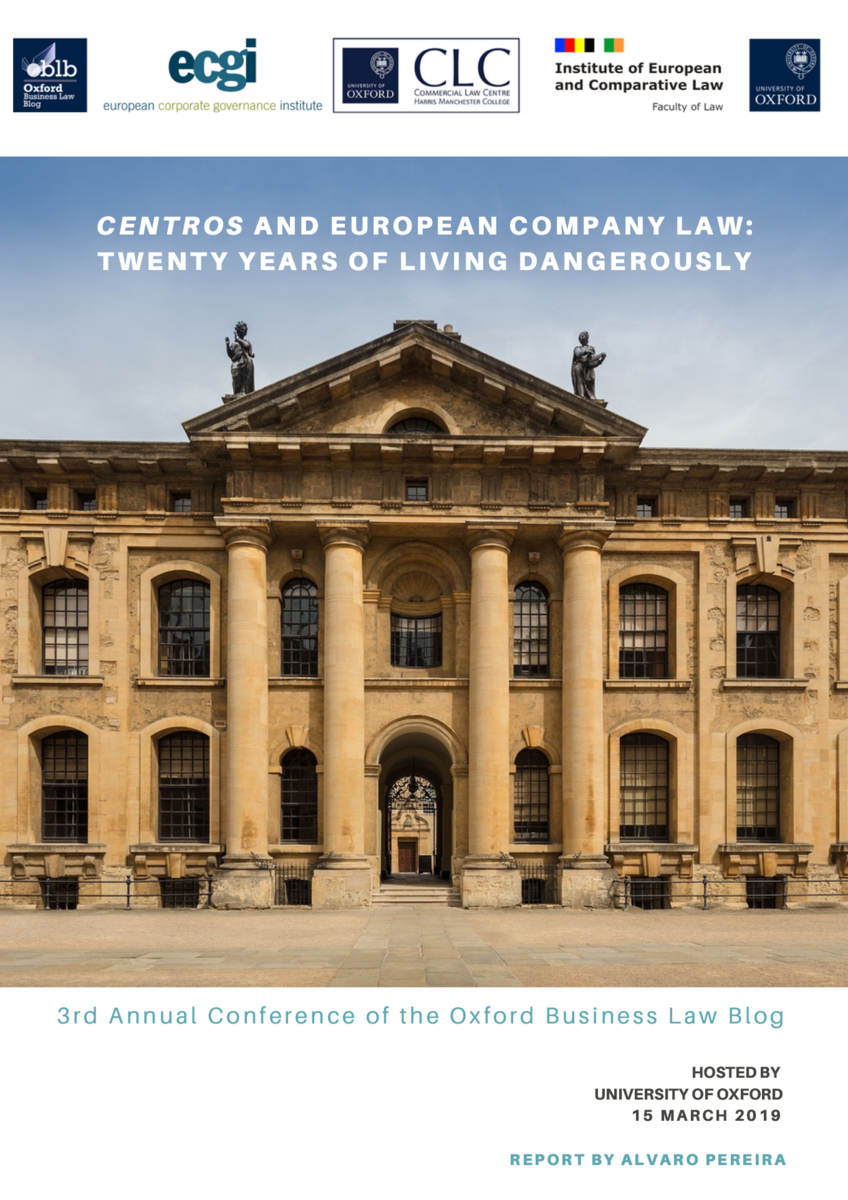Debunking the Centros Risks, after Twenty Years

March 2019 marked the twentieth anniversary of the landmark Centros case. It was the first of three judgments in which the (then) European Court of Justice affirmed companies’ freedom of establishment, creating the conditions for (often-feared) regulatory arbitrage and competition in corporate law. Recognising its continued relevance for comparative company law, the editors of the Oxford Business Law Blog selected the case to be the focus of its third annual conference, held on March 15 at St Hugh’s College, Oxford. The event was supported by Travers Smith, the European Corporate Governance Institute, the Oxford Law Faculty, the Commercial Law Centre at Harris Manchester College and the Oxford Institute of European and Comparative Law. The conference gathered leading experts to reflect on the decision and its impact, just a few days before Brexit’s original date. The presentations and discussions revealed that Centros’ influence extends far beyond European company law.
Twenty years ago, Centros generated fears of abusive regulatory arbitrage and a potentially inconvenient competition in company law. Yet, it seems that legal systems have adapted, debunking most of the perceived risks. Given the UK’s prevalence in the European market for corporate law, its withdrawal from the EU creates new challenges for Centros’ legacy. Despite uncertainty on the terms of the separation, it is clear that fundamental developments in European business law belong to a post-Brexit future. In company law, a pervasive challenge is defining the standards for cross-border conversion, and, in insolvency law, the protection of creditors in ex-post forum selection.
A Misunderstood Villain?
Regulatory arbitrage is one of Centros’ immediate and most commented upon consequences. The Court’s decision to grant companies the previously unavailable freedom of incorporation within the EU was perceived as a peril. It constrained states’ ability to control companies headquartered within their borders and, more generally, authorized a practice that has traditionally had a negative connotation. Because of this perception, most regulatory efforts have been centered on preventive measures such as harmonization, while others argue that the complete harmonization of legal systems is not realistic or desirable, and that companies should be allowed to seek regulatory advantages but also accept the costs of those decisions.
Furthermore, it might be said that regulatory arbitrage is not necessarily negative or dangerous. In fact, states themselves – often intentionally – leave room for choice when, for instance, they permit the coexistence of different legal forms or tax schemes. Selecting optimal rules is one of many decisions that are subjected to legal, ethical and other types of boundaries. The conference highlighted some additional forces that can hamper the practice of regulatory arbitrage. These include the lack of public trust (or ‘social license’), which often pressures companies not to use the law as advantageously as they could; the difficulties of simultaneously arbitraging various regulations; and the possibility to successfully induce legal changes that support business goals, which could be referred to as ‘regulatory entrepreneurship’. Regulatory arbitrage is a global business practice which could suggest that as long as there are differences in regulations, there will be opportunities for companies to strategically select the legal regimes that better support their goals, which might or might not align with those of society, thus prompting the question; why is there not more regulatory arbitrage?
The conference also explored some of the differences between companies and private parties noting that Centros is more restrictive of states’ defences than other cases involving natural persons, in that, unlike other rights of natural persons (ie, equal treatment of workers or citizens), freedom of establishment is more precisely defined in the treaty and the definition excludes states’ ability to impose conditions for its exercise, such as scrutinising the existence of a genuine link between the company and the state of incorporation. Another point made at the event, was that while companies may attempt to avoid the laws of the state of origin, individuals might typically pursue benefits in the host state, arguing that from a policy perspective, the Centros decision correctly limited states’ ability to invoke abuse-of-law arguments, as the opposite outcome would deter legitimate uses of the freedoms.
Disappointing Impact?
Since Centros, the scope of company law determines, on the one hand, the rules that companies can select when incorporating (regulatory arbitrage); and, on the other hand, the reforms that states might implement to either attract companies from other member states or retain their own (regulatory competition). The conference also considered the latter and argued that reforms reducing minimum capital and minimum pay-in requirements consistently curbed entrepreneurs’ willingness to incorporate in the UK and that, given entrepreneurs’ preferences, Centros mainly incentivized competition in the reduction of business registration procedures.
The contention was made that Centros did not produce significant corporate mobility, which is explained by both the narrow scope of corporate law in Europe as well as of states’ defensive mechanisms, and regulatory competition has not produced significant changes in corporate statutes. In Europe, the benefits that a rather thin company law framework offers to companies that incorporate out of their state of main office are outweighed by the costs of complying with other legal regimes, such as insolvency or tort. Despite these contentions, it was also recognised that the wave of company law reforms in continental Europe between 2003 and 2008 demonstrates that Centros did trigger some albeit limited regulatory competition. It also prompted improvements in company law such as the German UG, which significantly facilitated entrepreneurs’ access to limited liability. There was consensus that regulatory competition is a positive development in EU company law.
The Brexit Effect
By prompting regulatory arbitrage and competition, Centros increased the UK’s influence in the legal determinants of corporate behaviour in the EU. The anticipation of Brexit has now spurred mixed views on the scope of opportunity and potential damage that it is likely to cause. On the one hand, the legislative freedom provided by Brexit could be leveraged to amend UK capital rules. For example, abolishing the profit realisation requirement, as happens in Singapore. Furthermore, the changing shape of restructurings, triggered by changes in the financial market, may yet lead debtors to seek out English restructuring law’s adaptive capacity to the particular demands of restructuring complex leveraged capital structures.
On the other hand, the European Restructuring Directive (ERD, 2019) could reduce regulatory competition in corporate insolvency law in the EU causing the UK to lose its dominant market position. The 2019 ERD attempts to harmonize pre-insolvency proceedings, allowing small and medium enterprises to access the procedure in domestic legislations, thereby deterring forum shopping. Furthermore, it was argued that Brexit will exclude automatic recognition of UK judicial decisions, effectively eliminating the dominant competitor in the European restructuring market and a pressing incentive for reform. The decline of the popularity of the UK Scheme of Arrangement for foreign firms was offered as the beginnings of evidence supporting this hypothesis. Regardless of the specific outcome, and as other EU countries are working to occupy the space of the UK as a dominant jurisdiction in corporate and bankruptcy law, Brexit is likely to promote further competition.
The conference also made some salient connections between US regulatory competition and Europe. It proposed consideration of the 'varieties of capitalism' framework, and of the preferences of different types of entrepreneurs, among many other interesting points and suggestions. The full summary report is available below. It is also published here on the Oxford Business Law Blog (OBLB) as the first post in a series on Centros@20. Click here to subscribe to the OBLB.
******
Report Author:
Alvaro Pereira is a doctoral candidate at the University of California, Berkeley, School of Law and a Junior Academic Visitor at the University of Oxford, Faculty of Law.
Click here to access the detailed event summary report
